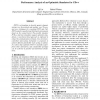48 search results - page 4 / 10 » Achieving Flexibility In Unification Formalisms |
ANSS
2007
IEEE
14 years 4 months ago
2007
IEEE
DEVS is a formalism to describe generic dynamic systems in a hierarchical and modular way. We present new techniques for executing DEVS and CellDEVS models in parallel and distrib...
ESORICS
2008
Springer
13 years 11 months ago
2008
Springer
Delegation is a mechanism that allows a user A to act on another user B's behalf by making B's access rights available to A. It is well recognized as an important mechani...
FOIS
2006
13 years 11 months ago
2006
Natural languages are easy to learn by infants, they can express any thought that any adult might ever conceive, and they accommodate the limitations of human breathing rates and s...
ACISICIS
2005
IEEE
14 years 3 months ago
2005
IEEE
Ubiquitous computing is viewed as a computing paradigm where minimal user intervention is necessitated emphasizing detection of environmental conditions and user behaviors in orde...
AIL
2004
13 years 9 months ago
2004
In this paper we provide a formal analysis of the idea of normative co-ordination. We argue that this idea is based on the assumption that agents can achieve flexible co-ordination...

